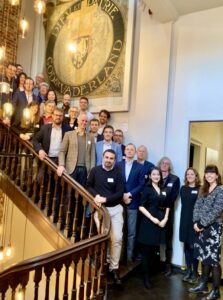The team behind ReConnect China met in Ghent to start the project
ReConnect China is funded under Horizon Europe and coordinated by the University Ghent in Belgium (Prof. Bart Dessein and his team). It aims to answer the question in which domains collaboration of the EU with China is desirable, possible or impossible. Against this backdrop, the following fields have been chosen for analysis: Science & Technology, Economy & Trade, Domestic Governance, and Foreign Policy. Moreover, a database which will provide access to new sources of information will be developed and experts on China will be gathered under a new European umbrella forum called “Europe-China Knowledge Forum”.
The project will run until October 2026 and has a financial volume of about 4m€.
From November 24-25 the team of 15 partners met in Ghent to start in its research agenda and to further define the work to be carried over the next four years. According to the words of Gaia Airulo, who represented the EC at the kick-off meeting, “the project has only increased in importance since the launch of this call given the most recent developments in China and between China and the EU”. For this reason and in order to create synergies where possible, ReConnect China is supposed to cooperate closely with its sister project DWARC funded under the same call (a first synergy meeting between the two projects took place on February 27 in Brussels).
The ReConnect China consortium brings together 15 partners from across Europe: Six universities (University of Ghent, University of Tartu, University of Turku, University of Groningen, University of Vienna and University of Olomouc), six think tanks (Egmont Institute, Clingendael Institute, Istituto Affari Internazionali, French Institute of International Relations, Swedish Institute of International Affairs, Elcano Royal Institute), one research institute (ZSI), one state agency (Innovation Norway) and one public institute under governmental administration (Macau Scientific and Cultural Centre).

ReConnect China has the following six objectives:
- Providing an independent understanding of China and its overall defining social, cultural, political and economic characteristics
- Identifying the EU’s own needs and strengths within new global narratives on China
- Developing a database of online public sources which enables day-to-day insights into policies, narratives, and public discourses in China
- Mainstreaming knowledge on China within the EU and creating new connections and synergies between intra-European China knowledge nodes
- Improving the European capacity to bring forward coherent and fact-based policy-making
- Enhancing the visibility of our independent expertise and making it available to external actors
These six objectives are pursued within our six thematic work packages.
Moreover, find more details on the EU’s financial contribution and on the background of partners on the CORDIS portal.